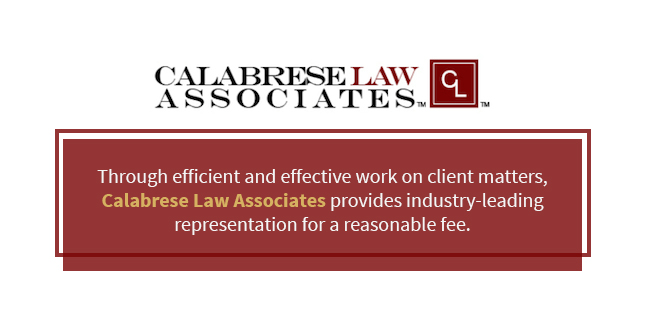Condominium Disputes and Construction Defects
Condominium Disputes and Construction Defects Involving Water Infiltration and Leaks
Condominium ownership allows for a unique opportunity in that the unit owners have exclusive rights to their individual condominium units and a collective interest to use and enjoy the whole property, within the limitations set forth by the condo bylaws. This sometimes-complex ownership arrangement is ripe for similarly complex disputes to arise.
The experienced condominium lawyers at Calabrese Law Associates in Boston have a proven record of helping unit owners and condominium associations alike resolve disputes and successfully litigate those claims when necessary. Give us a call today for help on your condominium construction dispute.
Rise in Condominium Defects
Construction practices in the mid-2000s resulted in an increase in construction defect claims across the country. There was a push to build faster, with a short supply of skilled contractors. New construction products and varying installation methods also contributed to the number of construction defects we see today.
Liability for construction defects exists in layers. Construction workers must be properly trained and supervised, otherwise the quality of their work can be called into question. Construction workers must also follow manufacturers’ installation specifications and guidelines when using various building products. A product that is improperly installed can create issues, such as water leaks. The improper installation of construction products and materials, however, places the liability on the installer and usually will not cause the manufacturer of the construction product to be held liable for damages.
Modern condominium building design and construction include more details, such as more corners, railings, and intersecting rooflines. These features make them particularly susceptible to water intrusion from the outside. Construction defects that allow water to penetrate are more likely in these types of buildings. Also, maintenance is more difficult and remediation efforts like mold removal are expensive.
A contractor who is focused on developing multiple projects might see an opportunity to cut costs in construction. Ultimately, the savings to the contractor can mean increased costs to unit owners and condo associations. It is necessary for owners to assign liability and seek damages via construction defect claims to repair and maintain a property that was not properly constructed to be water-tight and able to withstand the four seasons we experience in Boston and throughout Massachusetts.
The final layer of liability rests on the property owner to use and maintain the premises in a reasonable manner. For example, wet and mold-filled drywall may not be considered a construction defect if the owner did not take precautions to keep the water in the shower and instead let it run onto the adjacent wall.
Contact Our Condo Attorneys Now
Construction Defects in a Condominium Unit
Both condo unit owners and condominium associations have maintenance obligations.
What Repairs Are Condo Owners Responsible For?
As a general rule, condo unit owners are responsible for all repairs inside their condominium units. This may include:
- Drywall
- Flooring
- Plumbing
- Electrical Systems
- Appliances like ovens, microwaves, washers, and dryers
Who Is Responsible for Structural Issues in a Condo?
Typically, condo associations are responsible for structural issues, especially if they impact units in the building. For example, if a roof leak creates damage inside a condo unit, the condominium association would be responsible for fixing this construction defect. Additionally, when problems within the condo unit are created by conditions in a common area, that is an issue condominium associations are responsible for fixing.
The condominium association is also responsible for reimbursing the unit owner for costs they incurred to fix the construction defects inside their unit. Especially when the unit is relatively new, construction defects can account for a majority of problems discovered. If there is a potential issue, it’s a good idea to investigate the problem immediately.
What to Do When Construction Defects are Identified
When construction defects are discovered, the first step is to investigate and document the extent of the defect. The discovery of a water leak or defective drywall finishing could be indicative of a larger issue. It may be necessary to call in a plumber or a professional licensed contractor to render an opinion on the problem. If the problem is serious, like an active water leak, the unit owner should have it corrected immediately to mitigate any further damage.
One of the maintenance obligations condo unit owners have is contacting the condo association is an important early in this process. In a development with shared walls and common chases, construction defects may affect more than one unit. Due to their maintenance responsibilities, the condo association would want to be aware of the problem, and they should know about other similar or related problems that have been reported.
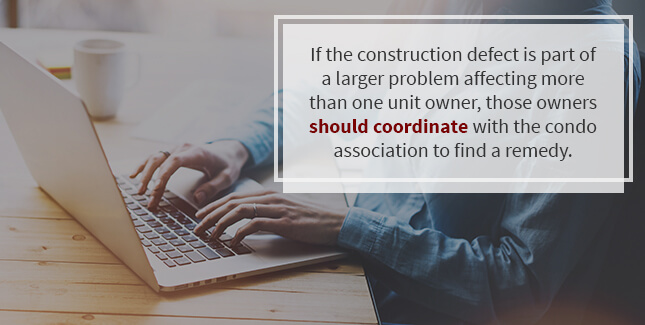
Individual condo unit owners have rights that may be strengthened when they join together with other owners who share a common problem. Consulting with the construction defect lawyers at Boston’s Calabrese Law Associates can help condominium unit owners understand their rights and how they should proceed. A single unit owner may bring a lawsuit against the contractor for a construction defect, or the unit owners affected may join forces in bringing a lawsuit.
The construction defect attorneys at Calabrese Law Associates can help the harmed parties determine which contractor might be at fault, and help them to negotiate a favorable settlement without going to court. Contact us to get help today.
Construction Defects That Cause Water Leaks in Common Areas
A “common area” is an area of the condominium property that is owned by all condo unit owners as a collective and is controlled or managed exclusively by the condominium association. Locations that are generally considered common areas include:
- On-site clubhouses: On-site clubhouses are shared spaces in a condominium or apartment building dedicated specifically to group activities. A clubhouse might include a pool, fitness center, media center, and spaces to hang out and relax with the community. Residents may also be able to rent clubhouses for private events. Since clubhouses can contain pools, they could be at risk for water damage.
- Swimming pools: Swimming pools are one of the most appealing features and common areas of a condominium. Though they used to be considered a luxury, pools are now a standard feature on a condo’s list of amenities. The pool is conveniently located, and residents don’t have to drive all the way to the ocean for a dip in the water on a hot day. A pool can pose risks for safety and water damage.
- Workout facilities: Along with pools, an amenity like a fitness center defines residential convenience and luxury and draws in new residents. Since workout facilities contain plumbing and water sources for amenities like fountains, toilets, and showers, they can be susceptible to water damage.
- Roofs: Construction defects on a roof can be especially vulnerable to water leaks, as roofs are exposed to the elements like rain and snow.
Who Is Responsible for Pipes in Condo Walls?
When there is a water leak or other construction defect in a common area, such as a roof leak, it is the responsibility of the condominium association to make the necessary repairs. Condo unit owners can seek monies from the condo association when their unit is damaged by a water leak coming from a common area. The classic example is a roof leak that causes damage to the interior of the top-floor condo unit.
Remember, when you notice a construction defect in a common area it is important to notify the other unit owners and to solidify cooperation among the owners affected by the construction defect. The group of affected condo unit owners can then approach the condo association together to address the construction problems.
Who Is the Proper Party to File Suit: The Condo Unit Owner or the Condo Association?
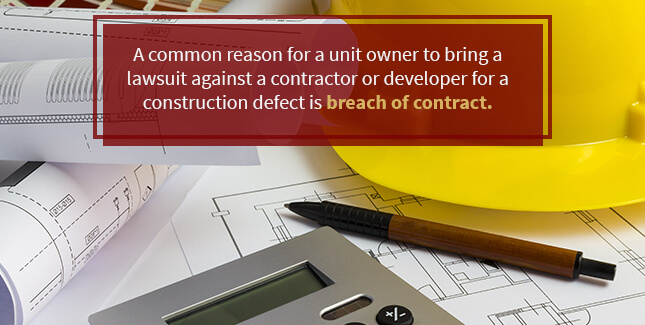
Conversely, negligent construction is an area where the condo association has exclusive authority to file a claim and pursue construction defect litigation. An individual unit owner who wishes to seek damages from a contractor for negligent construction must do so through the condo association.
Breach of Contract Litigation: Unit Owner vs. Contractor
When the claim against a contractor or developer for defective construction is based on a breach of contract between the condo unit owner and the contractor or developer, only the condo unit owner can file suit for such a claim.
According to Massachusetts law, the following applies to unit owners who want to pursue breach of contract litigation:
- When purchasing a condo unit, the owner does not give up certain rights to the condo association. Among them is the right to bring an action against the contractor for failure to deliver what was promised.
- Breach of contract claims are considered an “individual action” that can only be brought by a unit owner, and not a condo association. The law recognizes that contractors may make different representations to each unit owner and, therefore, the damages incurred would be unique to each unit owner.
- An individual unit owner has unique claims and damages under breach of contract, separate and apart from those of the condo association. In one such case, a condo association released the contractor from liabilities regarding a roof that an individual unit owner was then able to recover damages for. The contractor’s settlement with the condo association was held as a separate transaction from the breach of contract between the unit owner and the contractor.
Negligence Claim Litigation: Condo Association vs. Contractor
Negligence occurs when one party fails to use reasonable care, and as a result, another party is injured or property is damaged. A negligence claim alleges another person or entity is responsible for injuries or damage sustained by the claimant. Four factors must be found in a negligence claim to be successful – duty of care, breach of duty of care, damage caused by the breach, and foreseeability of this damage.
For negligence claims specifically related to condominiums, a construction negligence claim could arise from:
- Poor or inaccurate construction plans
- Failure to obtain the necessary permits
- Use of unsuitable of damaged materials
- Failure to properly use equipment or secure the construction site
- Errors in original design plans known to the builder that lead to damages
- Finished product that does not adhere to construction standards and codes

- The condo association is responsible for common expenses among unit owners for maintenance and repair of property they hold in common. This responsibility extends to fairly distributing common proceeds among unit owners, as well. These powers make the association well-suited to pursuing construction negligence claims and seeking damages for negligent construction on behalf of all owners.
- In negligent construction actions, the condo association acts on behalf of all owners. It would be difficult for the association to champion the unit owners’ interests were they to file individual construction negligence claims against the contractor for negligent construction.
- The condo association has the sole power to bring a lawsuit against a contractor regarding common areas of the development. Through ownership, the unit owners relinquish their power over and responsibility for common areas to the association. The condo association maintains these areas on behalf of the owners and, therefore, retains the right to file a construction negligence claim against the contractor for construction defects regarding these areas. Any proceeds from a lawsuit would then be distributed equitably to the unit owners.
Furthermore, the bylaws of the condo association may stipulate a specific procedure for disputes with third parties. The association is required to follow the bylaws with respect to giving notice, mediation, and arbitration. If the bylaws are not specific on this, the condo association can proceed according to Massachusetts law.
Can a Condo Owner Sue the Association?
Yes, condo owners can sue their condo associations for various reasons. Sometimes, condo unit owners find themselves in disputes with their condo association and require legal help. While the condo association is required to act in the best interests of the owners, sometimes the condo association fails to do so and must be compelled to do so.
An example of this would be if the condo association fails to follow the bylaws with respect to property maintenance. A defect in the roof — a common area of the condo property — might cause water damage to a single unit. If the condo association is trying to keep its fees down by not repairing the roof immediately, individual unit owners could suffer damages.
The balance of power between a unit owner and the condo association usually lies with the association. However, a collective of unit owners can have sway over the association. If it is possible to inform other unit owners that the condo association’s conduct is affecting their units, such communication among condo unit owners can be the first step in reaching a resolution.
Unit owners have the right to file a lawsuit against their condo association when the condo association violates Massachusetts law. However, as with any legal dispute, negotiating a settlement is usually the best resolution to these matters – better than going to court.
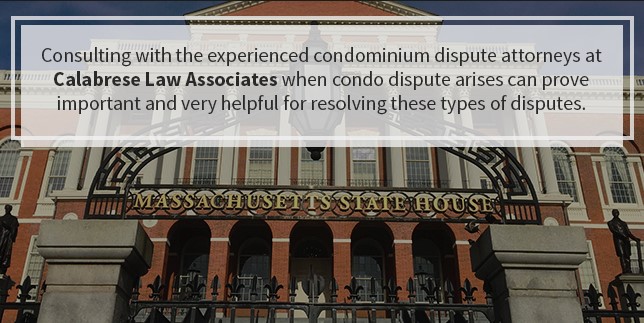
Duty to Pay Condo Fees and Condo Association’s Power to Place Lien
Under Massachusetts condo laws, a unit owner has a duty to pay condo fees, and if they fail to do so, a condo association has the power to place a lien on the unit for unpaid condo fees.
How Condo Associations Calculate Fees
A unit owner is required to pay a portion of all common expenses as assessed by the condo association. There are a couple of different formulas the association can use to determine the amount of money owed by each unit owner. Sometimes, the costs are divided equally, and sometimes, they are apportioned based on the relative size of each unit. The method for determining the amount of this debt should be stipulated in the master deed to the property.
How Late Payment Lead to Condo Unit Liens
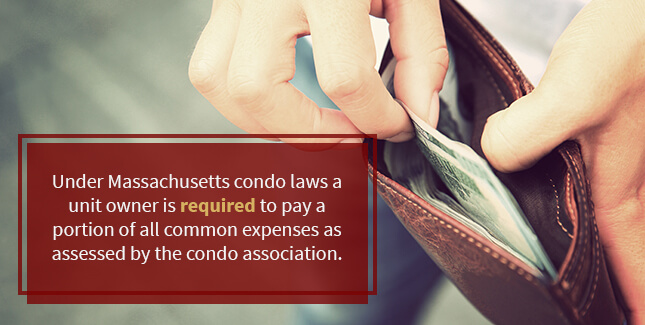
The condo association also has the power to assess fees for items that would affect the collective operating costs, considering metered conditions:
- Not metered separately: In the case of a property where water and utilities are not metered separately for each unit, the cost of installing a water-saving toilet or low-flow shower head can be assessed back to the unit owner.
- Metered separately: In a building where utilities are metered separately, the condo association can charge the unit owner for his portion of the usage, if it follows specific procedures of assessment.
Legal Process of a Condo Lien
The condo association has broad powers to assess fees to unit owners. Since a condo association’s fee can become a lien on the condo unit if the condo fees are not paid, withholding payments from the condo association is not a successful means of changing their position or course of action on any condo dispute issue.
Massachusetts law makes it easy for condo associations to place a lien on a condo unit and to “perfect” the lien through court action to collect on the lien. So long as the condo association follows the proper condo lien procedure, the condo association lien on the condo unit has priority over all other liens, including a mortgage on the property. Condo association liens also take priority over all other non-municipal creditors.
In the case of a maintenance or repair dispute, some other means of resolution are required. While the condo association has broad powers to assess and collect fees, it also has a responsibility to maintain the property for the enjoyment of all owners. Condo bylaws stipulate a procedure for removing board members or challenging the decisions of the association.
In the event of a lien notice going to the mortgage lender, it is likely the lender will pay the outstanding fees and add the amount to the mortgage principal. This helps protect the value of the property by ensuring the condo association has the funds necessary to continue to maintain the property. It also protects the lender’s interest by ensuring they are the first mortgage, or the first creditor, to be paid if the condo unit falls into foreclosure or if there is a sale of the unit.
How a Condo Unit Lien Can Lead to Foreclosure
If the condo association places a lien on the condo unit, the condo association can foreclose on the unit to recover its fees. In the case of a foreclosure, the condo association would get the money it was owed out of the proceeds of the sale of the condo before most other debts are repaid.
Maintenance and Repair Disputes
Most of the rights and responsibilities of unit owners and condo associations with respect to property maintenance are contained in the master deed and in the condo bylaws. In general, the association is required to maintain the property for the enjoyment of all unit owners without unreasonably interfering with the unit owner’s enjoyment of his own unit.
A unit owner is prohibited from doing any repairs or maintenance outside of his or her unit or repairs on their unit that might impair the safety of or interfere with the condo units of other owners at the property.
The resolution of a dispute between a unit owner and the condo association over the repair and maintenance of the property might involve the unit owner compelling the association to follow the guidelines set forth in the bylaws for maintenance and repair restrictions and requirements. Alternatively, a unit owner who is not satisfied with the association’s actions with regard to building maintenance and repair may need to petition the board to amend the bylaws.
Consulting with the condo dispute lawyers at Calabrese Law Associates in the Greater Boston Area is a good idea in the case of maintenance and repair disputes. Assigning liability and blame between a condo association and a unit owner can be difficult because of their overlapping interests. Our firm’s condominium attorneys are well-versed in Massachusetts condo laws. Often, condo disputes can be resolved without litigation, which is ultimately less costly for both parties. Contact our team to see which avenue is best for you today.
Learn More About Condo Disputes and Calabrese Law Associates
When the potential for a condominium dispute arises in the Greater Boston Area or anywhere in Massachusetts, contact Calabrese Law Associates. The firm’s experienced attorneys can answer questions about condominium disputes and construction defect actions. The firm’s condo and real estate lawyers will accurately assess your situation, protect your legal interest to the best extent possible under the law, and develop a strategy to move forward.
*Attorney Advertising. Prior results do not guarantee a similar outcome.
*This publication and its contents are not to be construed as legal advice nor a recommendation to you as to how to proceed. Please consult with a local licensed attorney directly before taking any action that could have legal consequences. This publication and its content do not create an attorney-client relationship and are being provided for general informational purposes only.
” src=”data:image/gif;base64,R0lGODlhAQABAIAAAAAAAP///yH5BAEAAAAALAAAAAABAAEAAAIBRAA7″ alt=”






